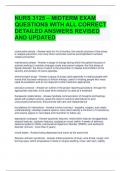NURS 3125 – MIDTERM EXAM
QUESTIONS WITH ALL CORRECT
DETAILED ANSWERS REVISED
AND UPDATED
continuation phase - Answer-lasts for 4 to 9 months; the overall outcome of this phase
is relapse prevention, but many other outcomes must be accomplished to achieve
relapse prevention
maintenance phase - Answer-a stage of change during which the patient focuses on
actively working to maintain changes made and prevent relapse; the final phase of
bipolar disorder, the focus of which is the prevention of relapse and limitation of the
severity and duration of future episodes
anticonvulsant drugs - Answer-a group of drugs used especially in treating people with
mania that has been refractory to lithium therapy; useful in treating people who need
rapid de-escalation and do not respond to other treatment approaches
seclusion protocol - Answer-an outline of the proper reporting procedure, through the
appropriate channels, to be used when seclusion is used as a treatment
therapeutic relationships - Answer-facilitate communication of thoughts and feelings,
assist with problem-solving, assist the client to examine alternatives to prior
unsuccessful behaviours, and promote self-care and independence
foundations for interactions - Answer-involve (connect - empathy, respect, and create
understanding), develop (explore options, have client identify a minimum of 3 solutions),
and resolve (agree on next steps and how/when to follow-up)
depression subtypes - Answer-psychotic features, melancholic features (exaggerated),
atypical features, catatonic features, postpartum onset (within 4 weeks of delivery),
seasonal patterns (SAD), premenstrual dysphoric disorder (PMDD), and dysthymic
disorder (chronic - more than 2 years)
mixed states - Answer-being depressed and manic at the same time
Stevens-Johnson syndrome - Answer-initial symptoms of fever, sore throat, cough, and
burning eyes, which progresses to facial or tongue swelling, hives, skin pain, rapidly
,spreading rash, and blisters on mucous membranes; treatment involves discontinuing
causative medication and replacing fluids
suicide - Answer-the intential act of killing onself by any means
suicide attempts - Answer-desparate calls for help with different levels of risk
suicide threats - Answer-more serious than statements of intent, usually accompanied
by behavioural changes
self-mutilation - Answer-intentional self-injury by cutting, burning, biting, etc
standards of nursing practice - Answer-authoritative statements that promote, guide,
direct, and regulate professional nursing practice
mental status examination - Answer-analogous to the physical examination in general
medicine; purpose is to evaluate an individual's current cognitive, affective (emotional),
and behavioural functioning
psychosocial assessment - Answer-an evaluation of the person's social functioning and
the systems in which the person operates
outcome criteria - Answer-the hoped-for outcomes that reflect the maximal level of
patient health that can realistically be achieved through nursing interventions
evidence-informed decision making - Answer-promoted by the Canadian Nurses
Association in nursing practice as a model for decision making that incorporates the
best available research evidence, with professional clinical judgement, client
preference, and collaboration with other key health stakeholders
health teaching - Answer-includes identifying the health education needs of the patient
and teaching basic principles of physical and mental health, such as giving information
about coping, interpersonal relationships, social skills, mental health disorders, the
treatments for such illnesses and their effects on daily living, relapse prevention,
problem-solving skills, stress management, crisis intervention, and self-care activities
self-care activities - Answer-assist the patient in assuming personal responsibility for
activities of daily living and focuses on improving the patient's mental and physical well-
being
psychological dependency - Answer-occurs when a drug becomes so important to an
individual's thoughts and actions that the person believes she or he cannot manage
without the substance
, physical dependency - Answer-a physiological state of cellular adaptation that arises
when the CNS and PNS become habituated to a psychoactive agent such that the
person physically needs the drug to function or to avoid the physical pain of withdrawal
addiction - Answer-the persistent, compulsive dependence on or use of a substance or
behaviour despite its negative consequences and the increasing frequency of those
consequences
compulsive behaviour - Answer-behaviour that does not have a biological element but
only psychological and social elements; exercising, gaming, gambling, internet use,
pornography viewing, shopping, smartphone use, studying, and work
integrated use - Answer-when a substance is used to enhance and already pleasurable
and ongoing experience
misuse - Answer-the stage of addiction when people begin to experience problems
associated with their use of alcohol, other drugs, or other behaviours
tolerance - Answer-a physiological experience that occurs when a person's reaction to a
substance decreases with repeated administrations of the same dose
withdrawal - Answer-the experiences and physiological changes that occur when blood
and tissue concentrations of a drug decrease in individuals who have maintained heavy
and prolonged use of a substance
concurrent disorder - Answer-the complex combination of a diagnosis of mental illness
and a substance abuse disorder or addiction
opioid drugs - Answer-act on endorphin receptors with a secondary effect on dopamine
blood alcohol level - Answer-a measurement of the percentage of alcohol in the
bloodstream, tested through urinalysis and breath screening devices, can be useful for
acute assessment purposes
alcohol poisoning - Answer-a state of toxicity that can result when an individual has
consumed large amounts of alcohol either quickly or over time
alcohol withdrawal - Answer-a physical reaction to the cessation or reduction of alcohol
intake that develops within a few hours of the last intake
alcohol withdrawal delirium - Answer-an altered level of consciousness, presenting with
seizures, following acute alcohol withdrawal; alcohol withdrawal delirium is a medical
emergency and can result in death even if treated
inhalants - Answer-volatile gases, substances that exist in a gaseous form at body
temperature, refrigerants, solvents, general anesthetics, and propellants




